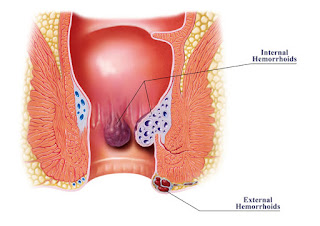Hemorrhoid
Hemorrhoids are swollen blood vessels of the rectum. The hemorrhoidal veins are located in the lowest area of the rectum and the anus. Sometimes they swell so that the vein walls become stretched, thin, and irritated by passing bowel movements. Hemorrhoids are classified into two general categories: internal and external.
Internal hemorrhoid is lie far enough inside the rectum that you can't see or feel them. They don't usually hurt because there are few pain-sensing nerves in the rectum. Bleeding may be the only sign that they are there. Sometimes internal hemorrhoids prolapse, or enlarge and protrude outside the anal sphincter. When this happens, you may be able to see or feel them as moist, pink pads of skin that are pinker than the surrounding area. Prolapsed hemorrhoids may hurt because the anus is dense with pain-sensing nerves. They usually recede into the rectum on their own; if they don't, they can often be gently pushed back into place.
External hemorrhoids lie within the anus and are usually painful. If an external hemorrhoid prolapses to the outside (usually in the course of passing stool), you can see and feel it. Blood clots sometimes form within prolapsed external hemorrhoids, causing an extremely painful condition called a thrombosis. If an external hemorrhoid becomes thrombosed, it can look rather frightening, turning purple or blue, and could possibly bleed. Despite their appearance, thrombosed hemorrhoids are usually not serious but can be painful. They will resolve themselves in a couple of weeks. If the pain is unbearable, your health care provider can remove the thrombosed hemorrhoid, which stops the pain.
What Causes Hemorrhoids?
About 30% to 40% of the people in the U.S. will suffer from hemorrhoids at some point in life; for most, this will happen between ages 20 and 50. Researchers are not certain what causes hemorrhoids. "Weak" veins -- leading to hemorrhoids and other varicose veins -- may be inherited.
 It's also likely that extreme abdominal pressure causes the veins to swell and become susceptible to irritation. The pressure can be caused by obesity, pregnancy, standing or sitting for long periods, straining during bowel movements, coughing, sneezing, vomiting, and holding your breath while straining to do physical labor.
It's also likely that extreme abdominal pressure causes the veins to swell and become susceptible to irritation. The pressure can be caused by obesity, pregnancy, standing or sitting for long periods, straining during bowel movements, coughing, sneezing, vomiting, and holding your breath while straining to do physical labor.Diet has a pivotal role in causing -- and preventing -- hemorrhoids. People who consistently eat a high-fiber diet are less likely to get hemorrhoids, but those who prefer a diet high in processed foods are at higher risk. A low-fiber diet or inadequate fluid intake can cause constipation, which can contribute to hemorrhoids in two ways: It promotes straining during a bowel movement and it also aggravates the hemorrhoids by producing hard stools that further irritate the swollen veins.
What Treatment available?
Once you develop hemorrhoids, they don't usually go away completely but they can get better, however, so that living with them is tolerable.
A diet rich in high-fiber foods and low in processed foods is best treatment for it. Increasing fluid intake to six to eight glasses a day also is important. Avoid taking of spicy, oily and salty food will be great in reduce the pain.
Over-the-counter creams can often ease your symptoms, at least for a little while. Don't use one with hydrocortisone for more than a week unless your doctor says it's OK. The topical steroid plus local anasthesia will provide fast relieve in pain and swollen.
Ice it down. Put a small ice pack on the area several times a day. It can help ease pain and swelling and give you short-term relief.
Consider painkillers. Take nonprescription pain medicine to help with hemorrhoid soreness. Acetaminophen or ibuprofen or Arcoxia can help.
The use of bioflavonoid to control hemorrhoids has become one of the more popular natural treatment options for hemorrhoid’s patients, since they can provide relief with little or no side effects.
This all-natural treatment for hemorrhoids because they help heal capillaries. Taken internally, bioflavonoids can help the body heal the inflammation of the capillaries that causes the hemorrhoids.
Bioflavonoid usually available in brand called Daflon 500mg. Daflon is a micronized purified flavonoid fraction containing 90% diosmin and 10% other flavonoids expressed as hesperidin.
It usually used on case like weak veins as we mentioned above.








https://blogs.elpais.com/espoiler/2010/01/no-es-it-crowd-pero-es-fm.html?cid=6a00d8341bfb1653ef026bdea7af0d200c#comment-6a00d8341bfb1653ef026bdea7af0d200c
ReplyDeleteشرکت تهویه نوین ایرانیان openstreetmap
ReplyDelete